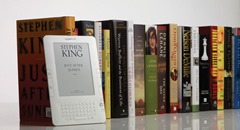 Only a few months after publishers expressed the belief that e-book sales were declining and print sales were coming back, the BBC takes a serious look at the question, “Are paper books really disappearing?” Given the publishers’ apparent belief to the contrary, and my earlier piece about the unlikelihood of this happening any time soon, I wondered who gave them that idea.
Only a few months after publishers expressed the belief that e-book sales were declining and print sales were coming back, the BBC takes a serious look at the question, “Are paper books really disappearing?” Given the publishers’ apparent belief to the contrary, and my earlier piece about the unlikelihood of this happening any time soon, I wondered who gave them that idea.
E-book pioneer Robert Stein, as it turns out. Stein, who co-founded early e-book publisher The Voyager Company and the Criterion Collection laserdisc company, also founded the Institute for the Future of the Book. He believes those complacent publishers are “reading the tea leaves incorrectly” and, once screens improve a little more, the plateaued e-reading market will once again begin to grow.
Stein imagines, for example, that future forms of books might be developed not by conventional publishers but by the gaming industry. He also envisions that the distinction between writer and reader will be blurred by a social reading experience in which authors and consumers can digitally interact with each other to discuss any passage, sentence or line. Indeed, his latest project, Social Book, allows members to insert comments directly into digital book texts and is already used by teachers at several high schools and universities to stimulate discussions. “For my grandchildren, the idea that reading is something you do by yourself will seem arcane,” he says. “Why would you want to read by yourself if you can have access to the ideas of others you know and trust, or to the insights of people from all over the world?”
I’ve expressed doubt before at statements that e-books would ever go through a transition that would change the entire way we read, and Stein’s prediction doesn’t seem to be any different. Both e-books and paper books work via the simple time-honored technique of reading all the words on one page and then going on to the next page. You can do it on any e-reader or e-book app without needing much in the way of familiarization. I just don’t see any call for adding confusing features that people may not even want. We read a book to glean ideas from the book—if we want insights from other people; there are other places we can go for those.
Mike Shatzkin projects that it could take 50 to 100 years for paper books to fade away entirely, but thinks that the inefficient nature of producing and distributing them will eventually take its toll. That seems like about the right timeframe to me, though others aren’t so sure it’s a good thing. The article cites a number of studies that purport to show e-books are not as easily comprehended as the paper kind, but also notes that there are other studies that say the opposite—e-reading is still in its infancy, and studies on it are simply too inconclusive as yet.
But for all the worries about e-books changing the way we comprehend the written word and interact with one another, [Center for Reading and Language Research director Maryanne] Wolf points out that “never before have we had such a democratisation of knowledge made possible.” While too much time on devices might mean problems for children and adults in places like Europe and the US, for those in developing countries, they may be a godsend, Wolf says – “the most important mechanism for giving literacy.”
The article is an interesting piece, even if it doesn’t delve as far into those figures purporting to show e-books’ “decline” as some have. It also includes an interesting look back at what may be the first commercial e-book—Peter James’s 1993 novel Host, originally published on two floppy discs. James himself believed that e-books would become more popular when they were as easy and enjoyable to read as paper, and his prediction by and large came true with the advent of the Kindle. The description of some of the backlash he experienced for the idea of publishing a book on floppy discs seems remarkably quaint now.
(Found via The Passive Voice.)
The post Publishing pundits think paper books may disappear, given a few decades appeared first on TeleRead.


















